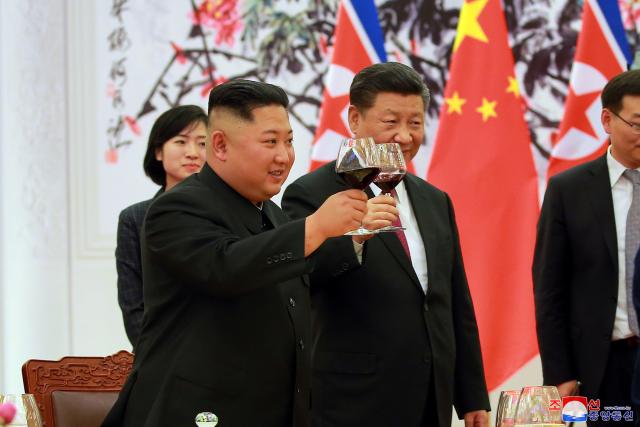Meeting Kim on his third trip to China this year, and just a week after Kim met Trump in Singapore on June 12, Xi said China was willing to keep playing a positive role to promote the peace process on the Korean peninsula.
Kim’s visit was the latest in a flurry of diplomatic contacts, and unlike during his previous two visits to China, the government announced his presence while he was in the country rather than waiting for him to leave.
Xi told Kim he was very happy to see the “positive” outcome of his meeting with Trump, and the important consensus reached on denuclearisation and setting up a lasting peace mechanism, according to Chinese state television.
“No matter the changes in the international and regional situation, China’s party and government’s resolute position on being dedicated to consolidating and developing Sino-North Korea relations will not change,” the report cited Xi as saying.
“The Chinese people’s friendship for the North Korean people will not change, and China’s support for socialist North Korea will not change,” Xi added.
Kim told Xi he hoped to work with China and other parties to push the peace process, Chinese state television said.
Asked about Kim’s latest Beijing visit, U.S. State Department spokeswoman Heather Nauert said, “we are watching it closely”.
She said Washington was in continuing communication with the North Korea government and added: “We look forward to them following through on their commitments and agreements that they made last week at the summit.”
At the Singapore summit, the first meeting between a serving U.S. president and a North Korean leader, Kim reaffirmed a commitment to “work toward complete denuclearization of the Korean peninsula”, while Trump said he would end “provocative” joint U.S.-South Korean military exercises.
Although Trump has hailed the Singapore summit as a success, skeptics have questioned whether he achieved anything new, given that Pyongyang, which has rejected unilateral nuclear disarmament, appeared to make no new concrete commitments.
The United States has led an international sanctions drive to press North Korea to abandon development of nuclear weapons capable of reaching the United States and Trump has expressed concern that China may be easing up on its enforcement of these steps.
South Korea and the Pentagon announced they would halt the annual Ulchi Freedom Guardian military drill scheduled for August.
At the summit, Trump also said North Korea had agreed to return remains of U.S. soldiers missing from the 1950-53 Korean War and U.S. officials said on Tuesday that that process could start within the next few days.
While not formally billed as a state visit, China gave Kim most of the trappings of one, including a welcome ceremony with honor guard in Beijing’s Great Hall of the People.
Xi greeted Kim warmly, in images carried on state television. The two men were accompanied by their wives.
Xi said he was pleased to see North Korea’s decision to promote economic reforms, adding that China’s own reform and opening up process had meant the Chinese people’s eyes had been open to the world.
North Korean state media had not mentioned Kim’s visit by early evening.
A Kim trip to China to discuss his summit with Trump had been widely anticipated in diplomatic circles. China is North Korea’s most important diplomatic and economic backer but has been angered by its nuclear and missile tests.
South Korea’s foreign ministry spokesman said South Korea and China shared the strategic goal of completely denuclearising the Korean peninsula.
“Our government hopes China will play a constructive role in resolving this problem,” ministry spokesman Noh Kyu-deok told a regular briefing.
“We hope Chairman Kim Jong Un’s visit will contribute to that.”
‘DUAL SUSPENSION’
China has welcomed the warming of ties between the United States and North Korea, and offered to help.
It has been particularly pleased by Trump’s decision to suspend military drills with South Korea. It has long proposed a “dual suspension”, whereby North Korea stops weapons tests and the United States and South Korea stop military drills, to encourage talks.
“South Korea and the United States have agreed to suspend all planning activities regarding the Freedom Guardian military drill scheduled for August,” South Korea’s defense ministry said in a statement.
The Pentagon confirmed the suspension, adding that the secretaries of defense and state as well as Trump’s national security adviser would meet on the issue this week.
Last year, 17,500 American and more than 50,000 South Korean troops joined the Ulchi Freedom Guardian drills, although the exercise is mostly focused on computerized simulations rather than field exercises.
The U.S.-South Korean exercise calendar hits a high point every spring with the Foal Eagle and Max Thunder drills, which both wrapped up last month.
The decision to halt military exercises in South Korea has bewildered many current and former U.S. defense officials, who only learned about it when Trump announced it in Singapore, after the summit with Kim.
Japan’s Chief Cabinet Secretary Yoshihide Suga said there would be no changes to joint drill plans between the United States and Japan, both of which regularly practise to deter North Korea.
“The United States is in a position to keep its commitment to its allied nations’ defense and our understanding is there is no change to the U.S. commitment to the Japan-U.S. alliance and the structure of American troops stationed in Japan,” Suga told a regular briefing.
Japanese Minister of Defense Itsunori Onodera said the decision to suspend the U.S.-South Korean exercises was made to support the diplomatic effort between the United States and North Korea but added it was “important to be wary of North Korea actions”.
“Our view of the threat has not changed. Joint training is an important in maintaining peace and stability in the region,” he said.
More about: #China
















































